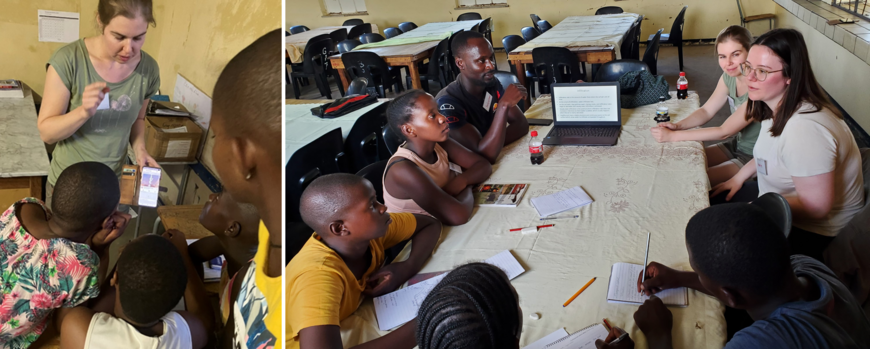April 2024: Collaborative work between scientists and learners
From March 21 to April 1, 2024, NamTip scientists Vistorina Amputu, Katrin Zimmer, and Lisa-Maricia Schwarz participated in a research camp organized by EduVentures at Waterberg Junior Secondary School. This camp brought together learners from five schools in the Greater Waterberg Region and was a key component of the NamTip project. In particular, the camp aimed to equip young learners with scientific research skills while raising awareness about the ecological challenges in the region.
The 20 participating learners engaged in various research projects co-designed by NamTip scientists and EduVentures educators. These projects included measuring plant biomass with drone imagery, comparing water filtration techniques, assessing herbaceous and invertebrate species diversity and abundance in commercial versus communal areas, and analyzing water infiltration rates in different soil types.
The collaboration between learners and scientists was extensive, with the scientists guiding the students through every stage of the research process. They helped define research questions, develop hypotheses, and design experiments, ensuring the research was methodologically sound and achievable. During the data collection phase, scientists trained the learners in proper data collection techniques and provided essential tools and resources. They also assisted in data analysis, teaching students how to use statistical tools, providing insights into data trends, and helping them draw valid conclusions based on their findings.
PhD student Lisa-Maricia Schwarz commented on the successful collaboration between NamTip scientists and educators: "We enjoyed nurturing the Namibian learners' keen interest in experiencing science firsthand. During the research camp, participants examined rangelands for soil properties, fodder availability, and insect and plant diversity. The learners impressed us with their enthusiasm and their ability to master their research projects. The direct exchange with these young scientists was a rewarding experience, and I hope that this research camp has further sparked their curiosity, deepened their desire to discover, and increased their awareness of the environment they live in."
This deep, ongoing collaboration ensured high-quality research and provided the students with valuable hands-on experience in scientific methods. By being involved in every key stage — from planning and data collection to analysis and interpretation — the scientists not only enhanced the research quality but also deepened the learners' understanding of desertification, preparing them as the next generation of environmentally conscious researchers.
More information on the activities of EduVentures in the framework of the NamTip project can be found here.

